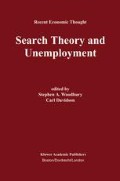Abstract
Search theory predicts that individuals will be more likely to exit unemployment as they approach the exhaustion of their unemployment benefits. Theory also predicts that individuals are likely to differ in the magnitude of their response to benefit exhaustion. The first prediction has been repeatedly verified. The second prediction has not been systematically tested but a close examination of the empirical literature provides some support. Building on this theoretical and empirical basis, I develop a parsimonious specification to examine variation in the impact of benefit exhaustion. The estimator can be implemented with standard statistical packages. An empirical example indicates that less educated workers have a much lower response to benefit exhaustion than more educated workers.
Access this chapter
Tax calculation will be finalised at checkout
Purchases are for personal use only
Preview
Unable to display preview. Download preview PDF.
References
Atkinson, A. B. and J. Micklewright. “Unemployment Compensation and Labor Market Transitions: A Critical Review.” Journal of Economic Literature 29 (1991): 1629–1727.
Corson, Walter and Walter Nicholson. “Trade Adjustment Assistance for Workers: Results of a Survey of Recipients Under the Trade Act of 1974.” Research in Labor Economics 4 (1981): 417–469.
Cox, D.R. “Partial Likelihood.” Biometrika 62 (1975): 269–276.
Devine, T. and N. Kiefer. Empirical Labor Economics: The Search Approach.New York: Oxford University Press, 1991.
Engberg, John. “The Impact of Unemployment Benefits on Job Search: Structural Unobserved Heterogeneity and Spurious Spikes.” Heinz School Working Paper, 1994(a).
Engberg, John. “Search Duration, Accepted Wages, and Selection Bias.” Heinz School Working Paper, 1994(b).
Gronau, R. “Information and Frictional Unemployment.” American Economic Review 61 (1971): 290–301.
Ham, John and Samuel Rea, Jr. “Unemployment Insurance and Male Unemployment Duration in Canada.” Journal of Labor Economics 5 (1987): 325–353.
Han, Aaron and Jerry Hausman. “Flexible Parametric Estimation of Duration and Competing Risk Models.” Journal of Applied Econometrics 5 (1990): 1–28.
Holzer, Harry. “Search Method Use by Unemployed Youth.” Journal of Labor Economics 6 (1988): 1–20.
Hunt, Jennifer. “The Effect of Unemployment Compensation on Unemployment Duration in Germany.” Journal of Labor Economics 13 (1995): 88–120.
Katz, L. and B. Meyer. “The Impact of Potential Duration of Unemployment Benefits on the Duration of Unemployment.” Journal of Public Economics 41 (1990): 45–72.
Lancaster, Tony. “Econometric Methods for the Duration of Unemployment.” Econometrica 47 (1979): 939–956.
Lippman, S. A. and J. J. McCall. “Job Search in a Dynamic Economy.” Journal of Economic Theory 12 (1976): 365–390.
McCall, Brian P. “Testing the Proportional Hazards Model in the Presence of Unmeasured Heterogeneity.” Journal of Applied Econometrics 9 (1994): 321–334.
McCall, JJ. “Economics of Information and Job Search.” Quarterly Journal of Economics 84 (1970): 113–126.
Meyer, Bruce D. “Unemployment Insurance and Unemployment Spells.” Econometrica 57 (1990): 757–782.
Moffittt, Robert. “Unemployment Insurance and the Distribution of Unemployment Spells.” Journal of Econometrics 28 (1985): 85–101.
Mortensen, Dale T. “Job Search, the Duration of Unemployment, and the Phillips Curve.” American Economic Review 60 (1970): 505–517.
Mortensen, Dale T. “Unemployment Insurance and Job Search Decisions.” Industrial and Labor Relations Review 30 (1977): 505–517.
R. Layard, eds. Amsterdam: Elsevier Science Publishers, 1986.
Narendranathan, W., S. Nickell and J. Stern. “Unemployment Benefits Revisited.” Economic Journal 95 (1985): 307–329.
Nickell, S. “Estimating the Probability of Leaving Unemployment.” Econometrica 47 (1979): 1249–1266.
van den Berg, G.J. “Nonstationarity in Job Search Theory.” Review of Economic Studies 57 (1990): 255–277.
Author information
Authors and Affiliations
Editor information
Editors and Affiliations
Rights and permissions
Copyright information
© 2002 Springer Science+Business Media New York
About this chapter
Cite this chapter
Engberg, J.B. (2002). Variation in the Impact of Benefit Exhaustion on Unemployment Duration. In: Woodbury, S.A., Davidson, C. (eds) Search Theory and Unemployment. Recent Economic Thought Series, vol 76. Springer, Dordrecht. https://doi.org/10.1007/978-94-010-0235-6_6
Download citation
DOI: https://doi.org/10.1007/978-94-010-0235-6_6
Publisher Name: Springer, Dordrecht
Print ISBN: 978-94-010-4003-7
Online ISBN: 978-94-010-0235-6
eBook Packages: Springer Book Archive

